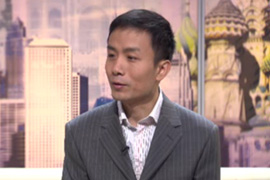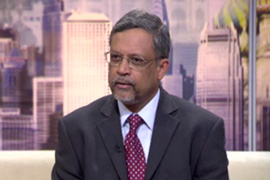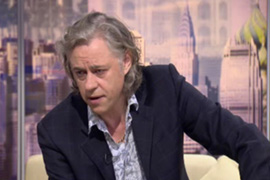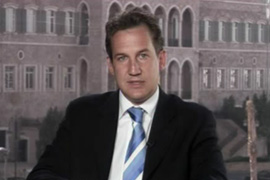 |
| Sir David Frost |
Every week, Sir David Frost, one of the most celebrated broadcasters, offers you a programme which takes its stories and guests from every part of the globe.
The world’s news makers will be interviewed with Sir David’s incisive style.
Sir David will get behind the headlines and examine the decisions and policies which shape global politics today.
|
Coming up this week on Frost over the World:
|
Gaza crisis
 |
| Azzam Tamimi |
Palestine has seen a week of violence on the streets resulting in more than 100 people dead and the West Bank and Gaza split from each other politically as well as geographically.
Sir David Frost is joined by Azzam Tamimi, the author of Hamas ‘Unwritten chapters’, and Sharif Nashashibi, the head of Arab Media Watch, to discuss whether this is the beginning of two Palestinian mini-states.
Tamimi tells
Frost Over The World that the violence in Gaza was inevitable and will, he hopes, lead to a better era.
 |
| Sharif Nashashibi |
It was not, he insists, between Hamas and Fatah but between the people of Gaza and a small but influential group acting in the name of Fatah and equipped by Israel and the US in order to hinder the government and prevent it from becoming functional. The speed with which Hamas was able to take over the Gaza Strip reveals, he says, the massive popular support for Hamas’ actions even among some within Fatah.
Nashashibi tells Sir David Frost that, although he was not surprised that Hamas won militarily in Gaza, he was surprised by the speed of their victory. But, he says that there is unlikely to be a military solution to the current crisis and the two sides will have to come to a political accommodation.
Chinese internet censorship
 |
Michael Anti, the Chinese journalist who had
his blog removed by Microsoft |
Over the past few years China has been criticised for its attitudes towards its internet users.
Like its press, China’s internet is heavily controlled by what is becoming known as the great firewall of China.
Google, Microsoft and Yahoo! have all been accused of co-operating with the Chinese censorship by blocking sites the government considers offensive.
In 2005 Michael Anti, a Chinese journalist, had his blog removed by Microsoft. He joins the show to discuss just how he managed to offend the Chinese government, the impact the internet is having in China despite the censorship and the ways in which people are getting around the prohibitions.
Piracy
 |
Pottengal Mukundan, the director of the
International Maritime Bureau |
The delivery of aid supplies to Somalia and East Africa is being affected and, in some cases, stopped because of pirates.
They may not actually fly the Jolly Roger but in many ways today’s pirates adopt the same tactics as the pirates of old; running down vessels and storming on board.
Last year there were more than 200 actual or attempted pirate attacks.
The body that attempts to combat piracy is the International Maritime Bureau. Pottengal Mukundan, the director of the bureau, reveals the techniques used by the modern-day pirates and the impact they are having.
Bob Geldof
 |
Bob Geldof explains why he is disappointed
by the outcome of the G8 summit |
The long list of aid commitments to developing countries that came out of the G8 meeting in Germany highlighted the richer nation’s apparent determination to beat global poverty and disease.
It included a commitment, they said, to give at least $60billion to combat Aids, Malaria and Tuberculosis.
Why then did the one man who has done more than most others put together to highlight the issue of global poverty describe the outcome of the summit as a total farce?
Sir David Frost asks Bob Geldof why $60billion is not generous.
Geldof explains that most of that sum had already been committed and that only $2.4billion was, in fact, new money.
He reveals who he holds responsible for the disappointing result, what he would have liked from the G8 and those he does believe are committed to meeting the Millennium Development Goals.
Assassinations in Lebanon
 |
| Omar Nashabe |
This week saw the seventh political assassination of an anti-Syrian figure since the former prime minister, Rafiq al-Hariri, was killed in 2005.
It was also the first since the UN Security Council voted in favour of an international tribunal to try the suspects in al-Hariri’s murder.
The tribunal has caused a deep divide in Lebanese politics with the anti-Syrian coalition and the government in favour of the tribunal and the Hezbollah-led opposition, and allies of Syria in general, vehemently opposing it.
 |
| Baria Alamuddin |
But the two sides are fairly evenly divided in Lebanon’s parliament. With this week’s death included the government’s majority is now down to just three.
But why is the tribunal so controversial and can it really be behind this week’s deaths?
Criminologist Omar Nashabe and journalist Baria Alamuddin join Frost Over The World to offer their opinions on the tribunal and whether it will offer closure for the Lebanese, and possibly vindication for Syria, or whether a decision taken by an outside force rather than an internal consensus could just result in more problems for Lebanon.
Frost Over The World airs at 18:00GMT every Friday on Al Jazeera English and is repeated during the week.
To suggest a guest for future shows or to make a comment click on ‘Send your feedback’ at the top of the page
To continue the debate on world events, please visit the
Your Views section of the website








